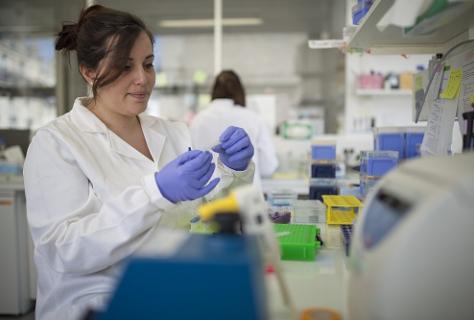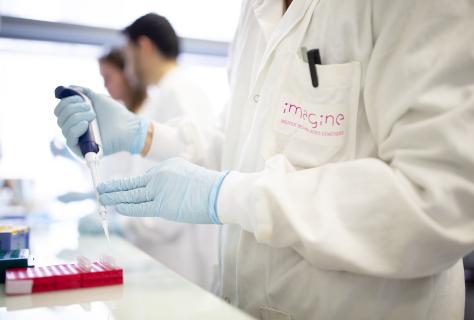Published on
Why does the individual response to SARS-CoV2 infection vary so much from person to person? Solving this mystery would make it possible to identify patients at risk, anticipate and improve their management and offer new therapeutic approaches based on a better understanding of the disease. Researchers from Inserm, University of Paris and AP-HP at Institut Imagine (hôpital Necker-Enfants malades AP-HP), and from the Rockefeller University and the Howard Hughes Medical Institute in New York, in collaboration with the team led by Pr Guy Gorochov at the Center for Immunology and Infectious Diseases (Sorbonne Université/Inserm/CNRS), have for the first time answered this key question. The Franco-American team, jointly led by Jean-Laurent Casanova and Laurent Abel*, has identified the first genetic and immunological causes explaining 15% of the severe forms of Covid-19. Patients have one thing in common: a defect in the activity of type I interferons, molecules of the immune system that normally have powerful antiviral activity. These discoveries would make it possible to detect people at risk of developing a serious form and to better treat this group of patients. The results of this work are published in the journal Science.
At the onset of the Covid-19 pandemic, researcher Jean-Laurent Casanova and his team set up an international consortium, COVID human genetic effort , to identify the genetic and immunological factors that could explain the occurrence of severe forms of the disease. They focused on patients with these severe forms, including some patients included in the French-Covid and CoV Contact cohorts promoted by Inserm. By targeting their research on specific mechanisms of immunity - the type I interferon (IFN) pathway, which are powerful antiviral molecules - the researchers have highlighted genetic abnormalities in certain patients that reduce the production of type I IFN (3-4% of severe forms). In other patients, they have identified autoimmune diseases that block the action of type I IFNs (10-11% of severe forms). All these discoveries would thus explain 15% of the severe forms of Covid-19.
They have been selected by the journal Nature as one of the 10 major discoveries of the year 2020.
The first paper published in Science describes genetic abnormalities in patients with severe forms of Covid-19 at the level of 13 genes already known to govern the IFN type I-controlled immune response against the influenza virus. Mutations in these genes are the cause of some severe forms of influenza. Surprisingly, these genetic variants are also present in adults who have not previously been particularly ill with influenza. The main consequence of these mutations is a defect in the production of type I IFNs. For example, this was shown in the laboratories of Ali Amara and Vassili Soumelis at the Saint Louis Research Institute using cells from a patient with a mutation in the IRF7 gene.
Regardless of age, people with these mutations are at greater risk of developing a potentially fatal form of influenza or Covid-19. A simple and quick way to detect some of these risk subjects could be the serum IFN type I assay using the ultra-sensitive digital ELISA technique used for this work by Guy Gorochov's team at the Center for Immunology and Infectious Diseases.
The early intake of type I IFN in these patients could be a therapeutic avenue. These drugs have been available for more than 30 years and without significant side effects if taken for a short period of time.
In the second study, also published in Science, the researchers show that patients with severe forms of Covid-19 have a high level of antibodies in their blood that are directed against the individuals' type I IFNs (autoantibodies) and are capable of neutralizing the effect of these antiviral molecules. These autoantibodies are found in more than 10% of patients developing severe pneumonia due to CoV2-SARS infection. Interestingly, they were found well before the pandemic in some patients who had been under long-term follow-up at AP-HP.Sorbonne Université for other pathologies. They are absent in people who develop a mild form of the disease and are rare in the general population. Their presence prevents type I NFIs from acting against the SARS-CoV2 virus. The production of these antibodies directed against the immune system of patients is likely indicative of other genetic alterations that are being studied. These individuals may benefit from plasmapheresis (removal of the liquid portion of the blood containing white blood cells and antibodies), or other treatments that may reduce the production of these antibodies by B lymphocytes.
The analysis of a control sample of 1,227 healthy people allowed to evaluate the prevalence of autoantibodies against IFN type 1 at 0.33% in the general population, a prevalence 15 times lower than that observed in patients with severe forms. These results suggest that the general population should be screened for these antibodies.
"Whether they are genetic variants that decrease the production of IFN type I during infection or antibodies that neutralize them, these deficits precede infection with the virus and explain the severe disease. These two major publications therefore highlight the crucial role of type I IFNs in the immune response against CoV2-SARS," conclude Jean-Laurent Casanova and Laurent Abel.
A way to understand the incidence of severe forms in men and those over 65 years old.
In the second publication, of the 101 patients with these antibodies to IFN type 1, 95 were male. This proportion is higher than that observed in patients with severe forms without neutralizing antibodies. In addition, one of the 6 women in whom the presence of autoantibodies could be detected, also had Incontinentia pigmenti, a genetic disease due to a mutation of a gene carried by the X chromosome, one of the chromosomes that distinguishes the female and male sex. These data suggest that the production of these antibodies could be linked to the X chromosome.
Furthermore, 49.5% of the patients who tested positive for these antibodies were over 65 years of age, compared to 38% in the rest of the cohort, which also suggests that the frequency of these antibodies increases with age.
* Jean-Laurent Casanova directs genetics and experimental immunology in both branches, while Laurent Abel directs genetics and mathematical epidemiology in both branches.
Read publications
Inborn errors of type I IFN immunity in patients with life-threatening COVID-19
Qian Zhang et al.
Science, 24 septembre 2020
Auto-antibodies against type I IFNs in patients with life-threatening COVID-19
Paul Bastardet al.
Science, 24 septembre 2020
To go further
From infectious diseases to genetic origins
The Franco-American laboratory of Jean-Laurent Casanova and Laurent Abel has already identified a hundred genetic diseases that may explain susceptibility to infections. While some people recover more or less easily from infections such as herpes, influenza, tuberculosis, hepatitis A, others develop serious clinical forms, even fatal, because they carry an alteration in a gene involved in the immune response to the infection in question.
In view of their knowledge of other pathologies, but also of the discoveries already made on COVID-19, they sought to determine whether innate errors altering the production of type I IFN could not be incriminated. These molecules are secreted by most of the cells in the body when they are infected with an RNA virus, which is the case with CoV2-SARS.
It has been shown that one of the markers of the response to infection, IFN type 1, which normally comes into play rapidly following a viral infection, was shown to be deficient in the response to CoV2-SARSS. In addition, persistent blood viral load is indicative of poor control of viral replication by the immune system in patients leading to the runaway of an ineffective and pathological inflammatory response.
Type 1 NFI defect: several genetic origins
With the help of their consortium and numerous international teams, the laboratory of Jean-Laurent Casanova and Laurent Abel sought to determine whether innate errors in the TLR3 and IRF7 genes, genes that induce the production of type I interferon (IFN), some variations of which are responsible for fatal influenza pneumonia or other viral infections, could also be implicated in severe forms of COVID-19.
A total of 13 genes, mutations in which have been implicated in severe viral infections, were screened in 656 patients of various origins, aged from one month to 99 years, hospitalized for severe pneumonia due to CoVID-SARS2. 117 variants were identified, compared to only 1 in the 534 patients with asymptomatic or mild forms. After experimentally testing these variants, the researchers showed that 22 of them affecting 8 genes - TLR3, UNC93B1, TICAM1, TBK1, IRF3, IRF7, IFNAR1, IFNAR2 - have a deleterious effect. For the other variants, they do not observe any effect that could justify their role in the immune response.
Administration of IFN type I may have a beneficial therapeutic effect at least at the onset of SARS-CoV2 infection in some patients.
When the adaptive immune system attacks the interferon pathway
In the second publication, they found that 101 of the 987 patients studied, all with life-threatening pneumonia following SARS-CoV2 infection, had high levels of neutralizing autoantibodies to IFN type 1 from the onset of their disease and even before infection: 49 patients against IFN-ω and IFN-ɑ2, 45 patients against IFN-ɑ2 only and 41 against IFN-ω. As a reminder, there are 17 IFNs of type I in humans: IFN-ɑ (with 13 subtypes), IFN-ω and IFN-β, IFN-epsilon, IFN-kappa. Very importantly, no neutralizing autoantibodies were detected in the 663 patients tested asymptomatic or suffering from a less severe form of COVID-19.
The analysis of a control sample of 1,227 healthy individuals allows them to assess the prevalence of autoantibodies to IFN type 1 at 0.33% in the general population, a prevalence 15 times lower than that observed in patients with severe forms of pneumonia.
These findings suggest that the general population should be screened for these autoantibodies.
A way to understand the incidence of severe pneumonia in men
Of the 101 patients with these antibodies, 95 were male. This proportion is higher than that observed in patients with severe forms without neutralizing antibodies. In addition, one of the 6 women in whom the presence of autoantibodies was detected, also had Incontinentia pigmenti, a genetic disease due to a mutation of a gene carried by the X chromosome, one of the chromosomes that distinguishes between males and females. This suggests that the production of these autoantibodies could be linked to the X chromosome.
This is in stark contrast to the much lower proportion of males in the population of COVID-infected but asymptomatic individuals (28%).
Furthermore, 49.5% of the patients tested positive for these autoantibodies were over 65 years of age, compared to 38% in the rest of the cohort, which also suggests that the frequency of these autoantibodies increases with age.






